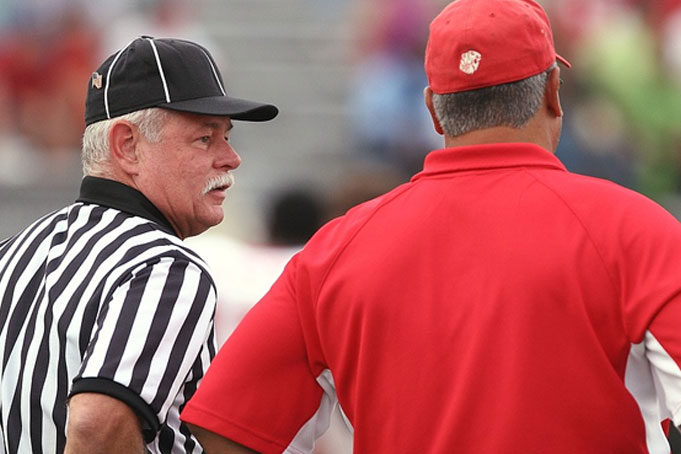It is human nature to argue. When someone challenges your authority, your opinion or your knowledge, it’s normal that your first reaction is to assume a defensive posture or attitude. How vociferously you defend your point of view usually depends on how sure you are or how strenuously the other person raises the question.
Officials aren’t expected (some would say allowed) to argue. In all but the rarest cases, officials are supposed to turn a deaf ear to criticism and arguments, letting the comments bounce off them like bullets off Kevlar. It is one of the most difficult aspects of officiating, but also one of the most important.
In everyday disputes, it’s satisfying to get in the last word or come up with a “zinger” that leaves the other person speechless. Take that habit onto the court or field and you’ll soon develop a reputation as a smart aleck. Right or wrong, officials are instead expected to be above such pettiness. Absorbing a certain amount of verbal abuse from coaches and players is considered part of the job. It would be wonderful to know exactly how much to take, but that isn’t possible. The best an official can do is end the argument as quickly as possible before things get completely out of control.
A phrase that will end many arguments regarding judgment calls is, “Coach, if it happened the way you say it did, I got it wrong.” It works because the official is not admitting a mistake, putting up a defense or ignoring the coach completely. Only a coach who wants to argue for the fun of it or is trying to intimidate an official will continue an argument after hearing that phrase. Any coach with those motives deserves to be ignored.
That statement also works when the dispute involves a rule. If the coach doesn’t volunteer his take on how the rule is interpreted, the official can ask for it. By eliciting information from the coach, the official turns the argument around and becomes the questioner, the person who actually controls the argument. Once the coach has offered his interpretation, the official can tell the coach that if his interpretation is correct, an error was made.
Whether the issue is a rule or a judgment call, the coach may ask you to get help from a partner or crewmate. Don’t be bullied into such a discussion, but if you are unsure and believe another official can help, go for help. Be sure the conversation is brief and takes place out of the coach’s earshot. When the discussion is over, explain to the coach why you’re sticking to your guns or are changing your call. In the latter case, be sure to explain the ruling to the opposing coach.
What's Your Call? Leave a Comment:
Note: This article is archival in nature. Rules, interpretations, mechanics, philosophies and other information may or may not be correct for the current year.
This article is the copyright of ©Referee Enterprises, Inc., and may not be republished in whole or in part online, in print or in any capacity without expressed written permission from Referee. The article is made available for educational use by individuals.
















